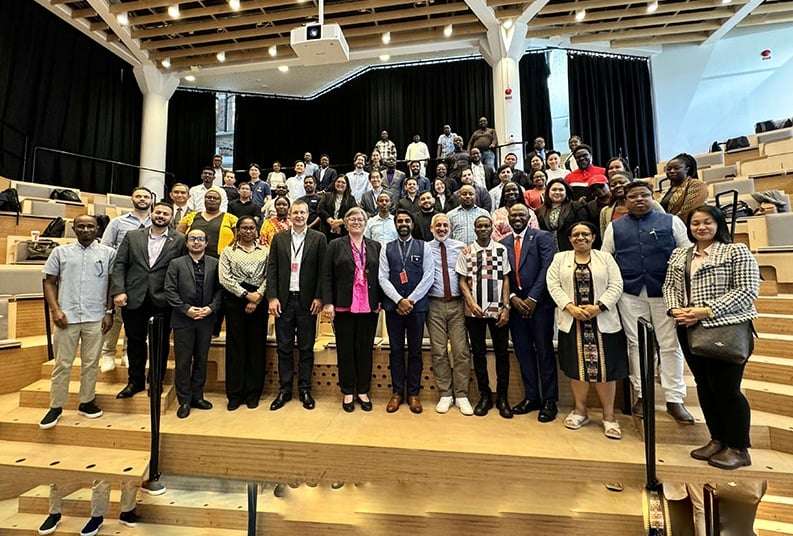In line with WMU’s commitment towards an ethical maritime sector, the 8th annual Maritime Business Integrity and Corruption Awareness (CORA) Seminar was held at WMU’s headquarters in Malmö, Sweden.
Issue of bribes
The seminar brought together a panel of academics, industry representatives and government officials to discuss and highlight the particular issue of demands for bribes and facilitation payments made of vessels and crews in the course of routine transit and port operations.
In his welcoming remarks, Professor Max Mejia, WMU President, stated that corruption affects the implementation of all 17 Sustainable Development Goals, by which WMU firmly stands.
(FAL Convention)
Addressing the seminar, Mr. Julian Abril Garcia, Head of the Facilitation Section, Maritime Safety Division at the International Maritime Organization (IMO), paid tribute to WMU for organizing the event,
Highlighting the new binding provisions in the Convention on Facilitation of International Maritime Traffic (FAL Convention) and the accompanying Guidance to implement and adopt procedures against maritime corruption (IMO document FAL.5/Circ.48).
New Guidance.
Earlier this year, the forty-eighth session of the IMO’s Facilitation Committee adopted a revised version of the Explanatory Manual to the FAL Convention (IMO document FAL.3/Circ.220), reinforcing the need for State Parties to follow the new Guidance.
WMU Associate Professor, Dr Aref Fakhry, spoke about a tightening regulatory framework across the world in tackling corruption in all its forms.
Proposal of (EU)
In the European Union (EU), a Proposal for a Directive of the European Parliament and of the Council on combating corruption is making progress toward final adoption. The measure is set to drastically increase sanctions and to revise definitions of corrupt behaviour across the EU Member States.
In his remarks, Mr. Janus Auken, Head of Business Transition at Synergy Denmark A/S, considered that the consequences for individual seafarers and masters caught by their companies in corrupt transactions could be devastating for their careers.
Cigarettes topped the requests !
Mr. Vivek Menon, Associate Director for Global Operations and Industry Engagement at the Maritime Anti-Corruption Network (MACN), presented figures showing that since 2011, more than 61,000 incidents of requests for bribes and facilitation payments were compiled in 1277 ports across 156 countries.
Cigarettes topped the requests in 63% of the reported cases. Ms. Minna Rasheed, Superintendent of the Maldives Customs Service, and WMU MSc graduate, highlighted the impacts of corruption on developing countries with a focus on small island developing states
The debate around bribes

Dr. Lisa Loloma Froholdt, Head of the Research Unit at the Centre of Maritime Health and Society at the University of Southern Denmark, enriched the debate around bribes and facilitation payments by pointing out elements from human psychology and her own observations on ship sailings.
Addressing maritime corruption
In his contribution, Captain Ahmed Abdelsalam Dawood, Marine Superintendent for the Suez Canal Authority referred to the competition dynamics which often create an offer of bribes and facilitation payments by shipping companies.
The seminar was delivered to the WMU MSc Class of 2024, who as part of the workshop explored challenges, impacts and suggested solutions in a series of corruption-related case studies derived from real incidents.
Respondents to the seminar’s evaluation questionnaire confirmed that addressing maritime corruption was an issue of importance. According to one student: “The seminar dealt with the avenues that allow corruption to exist in the private and public sector. It also emphasized using digital technology, stakeholders engagement, incentives and penalty as a means of minimizing corruption.
Ethics and morals were also explained as the foundation for good leadership and governance.” This was echoed in the statement delivered at the event by Mr. Bashir Hamza, President of the WMU Student Council.
IMO Guidance
The seminar underlined the relevance of considering corruption by future maritime and ocean policymakers and in university curricula.
President Mejia pledged to make anti-corruption themes an integral part of the curriculum, recognizing the importance of the subject, especially as “we now look forward to the implementation of the recently adopted IMO Guidance against maritime corruption.”




